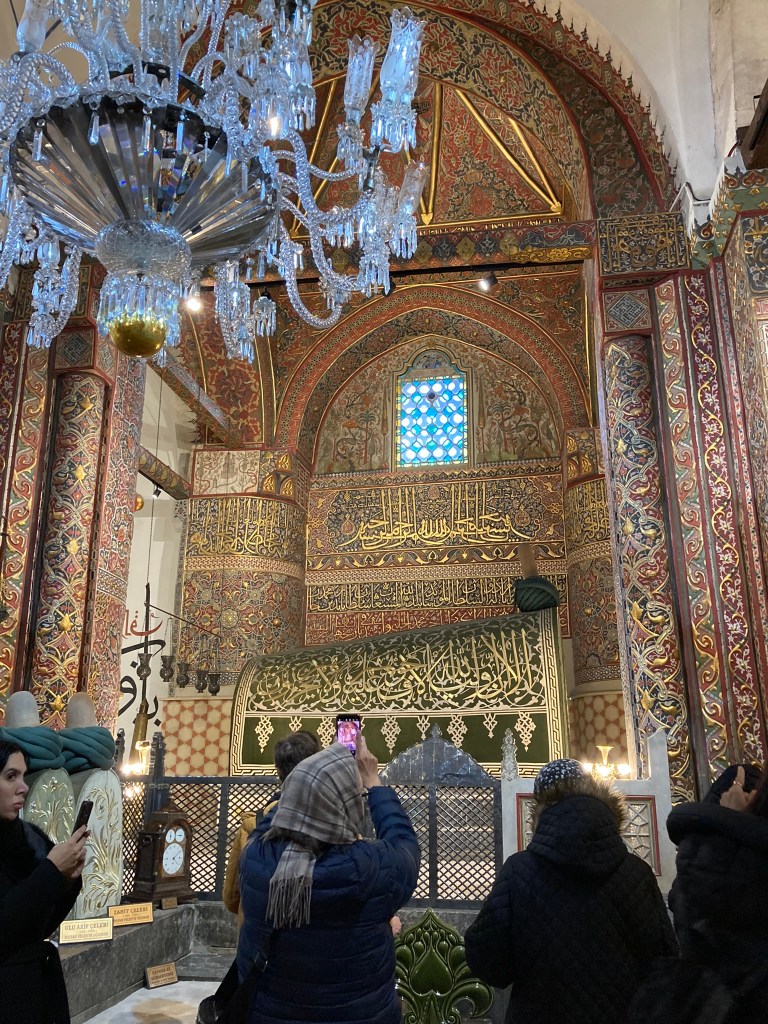On our journey through Turkey, we had the privilege of visiting the Mevlana Müzesi (Mevlana Museum) in Konya. This museum is not just a historical site but a spiritual beacon that draws visitors from around the world to explore the life and teachings of Jalal ad-Din Muhammad Rumi, the 13th-century Persian poet, Islamic scholar, and Sufi mystic.

Arrival at the Mevlana Museum
As we approached the Mevlana Museum, the iconic green dome of the mausoleum stood out against the Konya skyline. The museum complex, which includes Rumi’s tomb, is surrounded by beautifully manicured gardens, providing a serene atmosphere that invites reflection. The entrance to the museum was bustling with visitors donning disposable blue foot coverings.
The Spiritual Ambiance

Upon entering the museum, we were enveloped by a sense of tranquility. The soft murmurs of visitors, the scent of incense, and the sight of devout followers praying created a spiritual ambiance that was both calming and uplifting. The museum is housed in a former dervish lodge, where Rumi lived, taught, and wrote many of his famous works.
Exploring the Mevlana Museum Exhibits
The museum’s exhibits are a treasure trove of artifacts, manuscripts, and personal items belonging to Rumi and his followers. One of the first exhibits we encountered was a collection of Rumi’s original manuscripts. Seeing the delicate calligraphy and ancient paper brought a tangible connection to the past, highlighting Rumi’s enduring influence on literature and spirituality.

We also explored displays of musical instruments used in Sufi ceremonies, intricately designed prayer rugs, and robes worn by dervishes. Each artifact told a story of devotion and the pursuit of spiritual enlightenment. Particularly fascinating were the beautifully illuminated Qurans and the detailed explanations of Sufi rituals and practices.
Rumi’s Tomb
The heart of the Mevlana Museum is undoubtedly Rumi’s tomb. The tomb, adorned with intricate tile work and Arabic calligraphy, is a masterpiece of Islamic art. As we stood before it, we could feel the reverence that permeates the room. Pilgrims from all over the world come here to pay their respects, and the atmosphere is one of profound respect and contemplation.

We spent some time in quiet reflection, absorbing the significance of this place. The tomb is not just a resting place for Rumi but a symbol of his spiritual journey and his teachings of love, tolerance, and the unity of all beings.
The Semahane
Another highlight of our visit was the Semahane, the hall where the Whirling Dervishes perform their mesmerizing Sema ceremonies. This ritual dance, characterized by the dervishes’ spinning motion, symbolizes the soul’s journey towards God. While we didn’t witness a live performance, the exhibits and multimedia displays provided a deep understanding of this spiritual practice.
Reflections on Our Visit
Our visit to the Mevlana Museum was a deeply moving experience. It offered not just a glimpse into the life of one of history’s greatest mystics but also a profound sense of spiritual connection. Rumi’s message of love and unity transcends time and cultural boundaries, and standing in the place where he lived and taught was incredibly inspiring.

For anyone traveling through Turkey, a visit to the Mevlana Museum is a must. It’s not just a historical site but a journey into the heart of Sufi spirituality. Whether you’re a follower of Rumi’s teachings, a lover of poetry, or simply a curious traveler, the Mevlana Museum offers an enriching experience that will leave you with a deeper appreciation of the spiritual heritage of Turkey.
As we left the museum, the words of Rumi echoed in our minds: “Come, come, whoever you are. Wanderer, worshiper, lover of leaving. It doesn’t matter. Ours is not a caravan of despair. Come, even if you have broken your vows a thousand times. Come, yet again, come, come.” These words encapsulate the inclusive and loving spirit of Rumi and left us with a sense of inspiration.
Read more about our adventures in Turkey:
- Blue Mosque, Istanbul
- Hagia Sophia, Istanbul
- Hippodrome, Istanbul
- Topkapi Palace, Istanbul
- Spice Bazaar, Istanbul
- Gelibolu Barik, Gallipoli
- Troy Ruins, Canakkale
- Kolin Hotel, Canakkale
- Asclepieion of Pergamon, Pergamon
- Korumar Hotel, Kusadasi
- Virgin Mary’s House, Kusadasi
- Ancient Ephesus, Kusadasi
- Bizim Ev Hanimeli Restaurant, Selcuk
- Ephesus Museum, Selcuk
- Hierapolis Ruins, Hierapolis
- Martyrium of Saint Philip, Hierapolis

